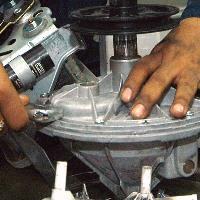(STRASBOURG) – Europe’s Parliament called on the Commission, Member States and producers Tuesday to take measures to ensure consumers can enjoy durable, high-quality products that can be repaired and upgraded.
At their plenary session in Strasbourg, MEPs said tangible goods and software should be easier to repair and update, and made a plea to tackle built-in obsolescence and make spare parts affordable.
77 per cent of EU consumers would rather repair their goods than buy new ones, according to a 2014 Eurobarometer survey, but they ultimately have to replace or discard them because they are discouraged by the cost of repairs and the level of service provided.
“We must reinstate the reparability of all products put on the market,” said Parliament’s rapporteur Pascal Durand MEP: “We have to make sure that batteries are no longer glued into a product, but are screwed in so that we do not have to throw away a phone when the battery breaks down. We need to make sure that consumers are aware of how long the products last and how they can be repaired”.
Parliament wants to promote a longer product lifespan, in particular by tackling programmed obsolescence for tangible goods and for software.
Its recommendations include:
- robust, easily repairable and good quality products: “minimum resistance criteria” to be established for each product category from the design stage,
- if a repair takes longer than a month, the guarantee should be extended to match the repair time,
- member states should give incentives to produce durable and repairable products, boosting repairs and second-hand sales – this could help to create jobs and reduce waste,
- consumers should have the option of going to an independent repairer: technical, safety or software solutions which prevent repairs from being performed, other than by approved firms or bodies, should be discouraged,
- essential components, such as batteries and LEDs, should not be fixed into products, unless for safety reasons,
- spare parts which are indispensable for the proper and safe functioning of the goods should be made available “at a price commensurate with the nature and life-time of the product”,
- an EU-wide definition of “planned obsolescence” and a system that could test and detect the “built-in obsolescence” should be introduced, as well as “appropriate dissuasive measures for producers”.
The Parliament is asking the Commission to consider a “voluntary European label” covering, in particular, the product’s durability, eco-design features, upgradeability in line with technical progress and reparability.
MEPs also propose creating a “usage meter” for the most relevant consumer products, in particular large electrical appliances, to ensure better information for consumers.
Further information, European Parliament
Resolution on a longer lifetime for products: benefits for consumers and companies
Study on “A longer lifetime for products: benefits for consumers and companies”


